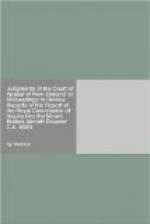Landreville v. The Queen (No. 2) (1977) 75 D.L.R. (3d.) 380, 402-405, was decided in the end on just such a ground. It was held that a Commissioner, who happened to be a distinguished Judge, had failed to put to the person whose conduct was expressly subjected to investigation by the terms of reference of the Commission a very serious allegation upon which a finding was made in the report; and that the Commission should have been reconvened for that purpose. There the relevant rule of natural justice was fully embodied in a statutory provision. We think that the position is the same under the New Zealand Commissions of Inquiry Act supplemented by the common law.
All these considerations suggest that the Commission was bound by the broad requirements of natural justice. These included a reasonable opportunity of meeting the unformulated allegation of organized deception and concealment that was apparently passing through the Commission’s mind. Some of the reasons why experience has shown the importance of this sort of opportunity were well put by Megarry J. in John v. Rees (1970) 1 Ch. 345, 402.:
“It may be that there are some who would decry the importance which the courts attach to the observance of the rules of natural justice. ‘When something is obvious,’ they may say, ’why force everybody to go through the tiresome waste of time involved in framing charges and giving an opportunity to be heard? The result is obvious from the start.’ Those who take this view do not, I think, do themselves justice. As everybody who has anything to do with the law well knows, the path of the law is strewn with examples of open and shut cases which, somehow, were not; of unanswerable charges which, in the event, were completely answered; of inexplicable conduct which was fully explained; of fixed and unalterable determinations that, by discussion, suffered a change. Nor are those with any knowledge of human nature who pause to think for a moment likely to underestimate the feelings of resentment of those who find that a decision against them has been made without their being afforded any opportunity to influence the course of events.”
In this particular case something more should be said. The applicants contend that this is not simply a case where the conspiracy suggestion could not have been rebutted. They plead in their statement of claim that the Commissioner’s findings to that effect are not based on evidence of probative value. Elsewhere in the present judgment we deal with aspects of these arguments. Here, dealing with principles, we add that fairness is not necessarily confined to procedural matters. It can have wider range. Remedies in this field are discretionary and the law not inflexible. If a party seeks to show not only that he did not have an adequate hearing but also that the evidence on which he was condemned was insubstantial, the Court is not compelled to shut its eyes to the state of the evidence in deciding whether, looking at the whole case in perspective, he has been treated fairly.




